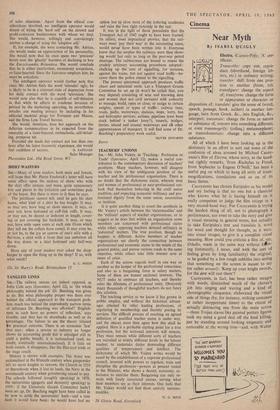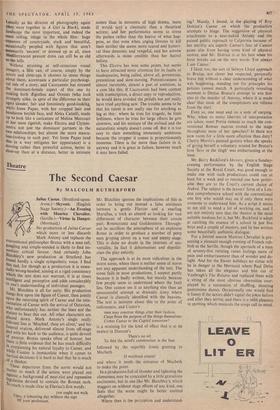Near Myth
By ISABEL QUIGLY
ters, etc.) in ordinary writing; • transfer: shift from one posi- Lir 11: tion to another (from, to); transfigure: change the aspect of; transform: change the form Transcribe: copy out, repro- duce (shorthand, foreign let- or appearance or character or disposition of; translate: give the sense of (word, speech, passage, book, author) in another lan- guage, turn from Greek, &c., into English, &c., interpret; transmute: change the form or nature or substance of, convert into something different; or even transmogrify: (colloq.) metamorphose; or transubstantiate: change into a different substance.
All of which I have been looking up in the dictionary in an effort to sort out some of the confusion of ideas aroused by Michael Cacoy- annis's film of Electra, whose story, as the hand- out rightly remarks, `from iEschylus to Freud, from Sophocles to Eugene O'Neill,' has been a useful peg on which to hang all sorts of trans- mogrifications, translations and so on of its basic theme.
Cacoyannis has chosen Euripides as his model and my feeling is that no one but a classicist who knows what he is basing himself on is really competent to judge the film except in a very second-hand way. For Cacoyannis is trying the hardest thing of all, not to photograph a performance, nor even to take the story and give it visual meaning in general terms, but actually to take Euripides's text and translate it, word for word and thought for thought, as it were, into visual images, to give it a complete visual meaning. How could you criticise a film of, say, Othello, made in the same way without }Aw- ing (intimately, I mean, and with the sort of feeling given by long familiarity) the original; to be guided by a few rough subtitles into seeing that something on the screen is meant to say (or rather arouse): `Keep up your bright swords, for the dew will rust them'?
Cacoyannis, in fact, has been rather meagre with words, diminished much of the chorus's job into singing and waving and a kind of choreographic eloquence, elaborated the visual side of things (by, for instance, striking costumes at rather inopportune times) to the extent of actually distracting one from the main action —three Trojan slaves like painted pottery figures took my mind a good deal off the final killing, just by standing around looking enigmatic and noticeable at the wrong time—and, with Walter Lassally as his director of photography again (they were together in A Girl in Black), made landscape the most important, and indeed the Most telling, image in the whole film: huge expanses of countryside, stark and beautiful, occasionally peopled with figures that aren't necessarily 'ancient' or dressed up at all, since Mediterranean peasant dress can still be as old as the hills.
Without straining, at self-conscious visual imagery, a film can, of course, simply by the actors and close-ups it chooses to stress things about them, accentuate a particular psychologi- cal side of a story, and Cacoyannis has stressed the dominant-female aspect of this one by making both tEgisthus and Orestes (who look strangely alike, in spite of the difference in their ages) slender, fair and femininely good-looking, while Irene Papas, with her cropped hair and handsome boyish face, and Aleka Catselli, made up to look like a caricature of Melina Mercouri at her most tigerish, make Electra and Clytem- nestra not just the dominant partners in the two relationships, but almost the more mascu- line-looking in each pair. Yet Irene Papas (and this in a way mitigates her appearance) is a moving rather than powerful actress, better in close-up than at a distance, better in intimate
scenes than in moments of high drama, more (I would say) a cinematic than a theatrical actress; and her performance seems to stress the pathos rather than the horror of what hap- pens, so that even when urging Orestes to kill their mother she seems more scared and hysteri- cal than dxmonic and vengeful, and her sorrow afterwards is more credible than her hatred before.
This Electra has won some prizes, but seems to have attracted more attention for its faults or inadequacies, being called, above all, portentous, pretentious and slow-moving. Pretentiousness is almost inevitable, almost a part of ambition, in a case like this. If Cacoyannis had been content with transcription, a direct copy or reproduction, he would have avoided the pitfalls but not really have tried anything new. The trouble seems to be that his talent is not really one for anything as big as this: where he tries for tragedy, he finds heftiness, where he tries for large effects he gets slowness, and his mixture of the stylised and the naturalistic simply doesn't come off. But it is too easy to slam something immensely ambitious because the cropper it comes is proportionately immense. There is far more than failure in it, anyway and it is great in failure, however much it may have failed.



































 Previous page
Previous page